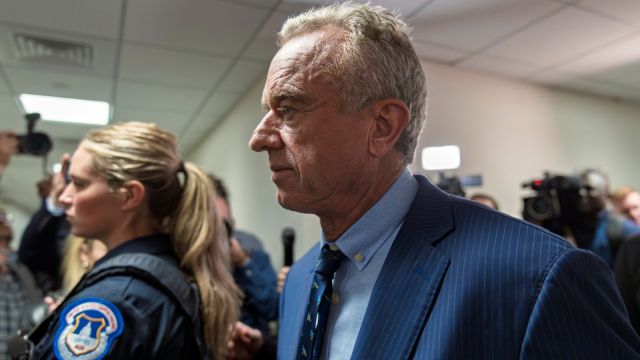RFK Jr. meets with senators as questions swirl about Trump’s pick to lead health agency
Kennedy's nomination will test the nation's emerging political realignment, as Trump expands his base of supporters to include former Democratic voters shifting elsewhere.
 Robert F. Kennedy Jr., President-elect Donald Trump's nominee to be secretary of Health and Human Services, arrives to meet with Sen. Markwayne Mullin, R-Okla., a member of the Senate Committee on Health, Education, Labor, and Pensions, at the Capitol in Washington. (AP)
Robert F. Kennedy Jr., President-elect Donald Trump's nominee to be secretary of Health and Human Services, arrives to meet with Sen. Markwayne Mullin, R-Okla., a member of the Senate Committee on Health, Education, Labor, and Pensions, at the Capitol in Washington. (AP)Robert F. Kennedy Jr. swept onto Capitol Hill late Monday, as the anti-vaccine health guru from the famous political family reintroduced himself to senators, this time as President-elect Donald Trump’s pick to lead the nation’s Health and Human Services Department.
It was a soft-opening debut for Kennedy, whose wide-ranging views — yes to raw milk, no to fluoride, Ozempic and America’s favourite processed foods — are raising alarms in the scientific community and beyond. In the Senate he’s facing a mix of support, curiosity, skepticism and downright rejection among the senators who will be asked to confirm him to Trump’s Cabinet.
Kennedy’s first stop Monday was on potentially friendly terrain, to the offices of GOP senators allied with Trump, the start of a weeks-long process.
Ahead of the nominee’s visits, Trump said he’s a “big believer” in polio vaccines and sought to tamp down fears about Kennedy, saying he will be “much less radical” than people think.
The man known simply as RFK, Jr., is the latest in the Trump rival-turned-partner orbit, a former Democratic presidential hopeful now in line to run the world’s largest public health agency, with its whopping USD 1.7 trillion budget, and some of the U.S. most important public services.
HHS has a broad reach across the lives of Americans — inspecting the nation’s food, regulating medicines and overseeing research of diseases and cures. It provides health insurance for nearly half of the country — poor, disabled and older Americans, including via Medicare.
Richard Besser, CEO of the Robert Wood Johnson Foundation and former acting director of the Centers for Disease Control and Prevention, called Kennedy “a truly dangerous” choice.
Besser, in an op-ed in U.S. News and World Report, said Kennedy, 70, stands out as a “single potential Cabinet member who could do the most damage to the American people’s lives.” Ahead of Kennedy’s arrival he was given a word of advice from one important voice: outgoing Senate GOP Leader Mitch McConnell, a childhood polio survivor, who cautioned the nominee against views opposing the vaccine.
“Anyone seeking the Senate’s consent to serve in the incoming Administration would do well to steer clear of even the appearance of association with such efforts,” McConnell said recently.
The incoming GOP leader, Sen. John Thune of South Dakota, said Kennedy will have to address questions about his views on the polio vaccine and other issues.
“Well I think he’ll have to address that,” Thune said. “We’ll find out.” But hardline Rep. Marjorie Taylor Greene of Georgia, a House member who has no vote in the confirmation process, has been influential in supporting and amplifying Kennedy’s views on vaccines.
And GOP Sen. Thom Tillis of North Carolina said his mind is not made up. “I’m open. I’m not predisposed one way or the other,” Tillis said Monday evening.
Kennedy’s nomination will test the nation’s emerging political realignment, as Trump expands his base of supporters to include former Democratic voters shifting elsewhere. Kennedy’s views find favour but also also opposition from both sides of the political aisle.
Other Trump nominees are also expected back on Capitol Hill this week. The president-elect’s choice of Pete Hegseth for Defense Secretary, Tulsi Gabbard for Office of the Director of National Intelligence, Kash Patel for FBI director and others are all running into turbulence from wary senators.
With Republicans taking control of the Senate in the new year, Trump’s nominees have a pathway to confirmation. But with just a 53-47 majority, any nominee can only lose a handful of GOP supporters, in the face of Democratic opposition.
Photos



- 01
- 02
- 03
- 04
- 05




























